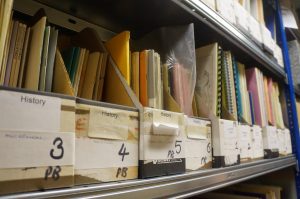The University of Bristol holds a unique collection of materials related to feminist and women’s liberation movements in the UK. The Feminist Archive South is based in the University’s Special Collections department where I have been working with a trustee of the archive, D-M Withers, to put together a teaching resource for lecturers who want to include materials from the archive in their teaching. The archive was established primarily through the work of activists who contributed their personal collections and by the acquisition of materials by feminist archivists on a vast array of topics. Most of the materials date from the period 1960-2000 and include everything from books, magazines, posters and personal letters to vinyl records, clothing, badges and other ephemera.
 (Photo credit: D-M Withers, 2017)
(Photo credit: D-M Withers, 2017)
The collection was catalogued using the indexing system of the European Women’s Thesaurus. In archivists’ terms, a thesaurus provides a list of terms used to classify or index and locate information in libraries. As Tilly Vriend writes, the major classification systems such as the Dewey Decimal and Library of Congress systems are not neutral tools for organising and classifying information and materials, but reflect the particular presumptions of their creators and are the products of social and political forces. The Universal Decimal System has the more well-known examples of how sexism shapes the practices of indexing: in this system, “the term Women could be found under the category Morals and Customs, Menstruation under Medicine, and Lesbian women under categories such as Psychopaths and Hysterics” (Vriend 2009: 3). The European Women’s Thesaurus and its precursor, the Dutch Women’s Thesaurus, sought to explicitly reject these tendencies and generate new categories.
 (Photo credit: D-M Withers, 2017)
(Photo credit: D-M Withers, 2017)
The archive thus marks the important role that women’s libraries played as sources of information in an analogue age. In the heterogeneous array of materials brought together in the archive, we are also witness to the historical and geographical ‘event’ of bringing new kinds of political subjects into being. The archive contains the papers of several Bristol-based feminist activists, some of whom authored Half the Sky, one of the first British women’s and gender studies readers, published by Virago in 1979 and aimed at providing a resource for adult education courses in women’s studies. It holds print runs of magazines such as Mukti and FOWAAD written and published by black and Asian feminists in the UK to address sexism, racism and imperialism. There is material related to Greenham Common, guides for the volunteer pregnancy testers holding free pregnancy test clinics in an era before home testing, and so much more. My attention is drawn to the many materials related to ‘being a body’, including testimonials from the late 1970s of experiences of menstruation and volumes of leaflets and essays on feminist concerns over health and technology. Materials on birth, contraception, abortion, menopause, HIV/AIDS, drug use and cervical cancer are there, as well as organizational materials related to disability support groups, to the establishment of Well Women centres around the UK and to efforts to connect transnational feminist health activists with each other. And there is an intriguing account of architectural plans for feminist antenatal waiting rooms in the NHS!
The archive is in need of extensive cataloguing, so in addition to generating examples of how material in the archive can be used for teaching, we hope to secure resources to help carry out this important work. Our aim is to also incorporate collective annotation in the next phase of the archive’s life as a digital resource in which readers in the archive provide their own descriptions of materials in the catalogue to be shared with others. This corresponds to the collective and revolutionary spirit that animated the feminist archive at its inception – to preserve and sustain alternative sources of knowledge and experience. In this way, we are exploring how theories of digital culture (Withers 2015) and the ‘social scientist in the archive’ (Moore et al. 2016) can contribute to making the archive a community and communal resource for educators, researchers and activists. D-M and I will be presenting our work in and on the Feminist Archive South at a workshop on ‘Making School in the Age of the Screen’ at Liverpool Hope University on the 26-27 May 2017 and at a public exhibition as part of the University of Bristol’s Brigstow Institute on the 23-24 October 2017. If you’re in Bristol, you can visit the archive by contacting the wonderful Special Collections librarians or come to one of our upcoming ‘Collective Annotation’ workshops in June and July 2017. And do get in touch if you want to know more!
Dr Maria Fannin is from the School of Geographical Studies at the University of Bristol.
Contact: m.fannin@bristol.ac.uk